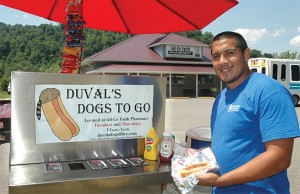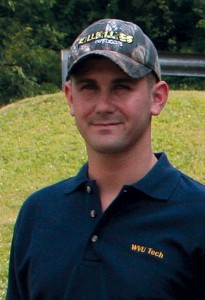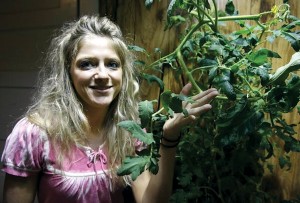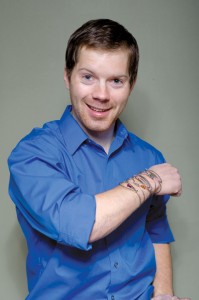By Laura Burdette and Jennifer Jett
 When considering the average college student, one might envision a social butterfly who sleeps too late and barely makes deadlines on research papers. For four West Virginia students, however, social status has taken a backseat to the thrill ride of entrepreneurialism. These students—Karl Duval, Keri Fridley, Patrick Elswick and Robert Loehr—go beyond the usual amount of hours applied to higher education by adding business ownership to their student planners.
When considering the average college student, one might envision a social butterfly who sleeps too late and barely makes deadlines on research papers. For four West Virginia students, however, social status has taken a backseat to the thrill ride of entrepreneurialism. These students—Karl Duval, Keri Fridley, Patrick Elswick and Robert Loehr—go beyond the usual amount of hours applied to higher education by adding business ownership to their student planners.
West Virginia is growing every year by way of entrepreneurs and innovators, and these ambitious college students are simply building one more stepping stone to the state’s place in the sun. These four individuals work to better their communities, to better themselves and to do something in life that they have a passion for. Karl Duval seeks to supply Glenville’s local community with fresh hotdogs while Patrick Elswick provides a special connection for sportsmen across the region. Keri Fridley grows hydroponic fruits and vegetables for the people of Huntington, and Robert Loehr spends his time creating unique art for locals and tourists alike.
Learn more about these growing businesses and how each of these college students works hard to stay on top of their hectic schedules.
Duval’s Dogs To Go
 Karl Duval, Glenville State College
Karl Duval, Glenville State College
The greatest things, at times, come to us in the most unexpected ways. That is exactly what happened when a young football player was recruited to a small-town college in West Virginia and was struck by the entrepreneurial spirit. Karl Duval, a Miami, FL-born 21-year-old senior at Glenville State College in Glenville, WV is among the first generation of his family born in America, and he is now pursuing an American dream of his own.
Duval is chasing the American dream of entrepreneurialism by combining an idea, classroom techniques and a bit of fortitude to develop the beginnings of a small business named Duval’s Dogs To Go, a small New York-style vending cart.
“It’s amazing how I’ve been able to implement what I’ve learned in the classroom. Now I am more confident in myself and my abilities,” says Duval. This confidence, which was once displayed on the football field, has morphed into the opportunity of a lifetime in business ownership. After suffering a knee injury, Duval chose to complete his education at Glenville State College by pursuing his bachelor’s degree in business management. At the same time, he was constantly coming up with new business ideas and ways to make money. With his 100 percent beef franks and fresh home-made toppings, he decided to enter the “dog-eat-dog” world of business.
Duval has only been in business since April 2010, but his growth has been consistent, leaving him little time to focus on much else aside from his studies. He sets his cart up two to three days a
week at lunch time at Gil-Co Faith Pharmacy and watches the hungry passers-by flock to his food. He also sets up at the Gilmer County Farmer’s Market and has been a steady face at several local fairs this summer.
As a student business owner, he says his biggest challenge has been time management. “A lot of people have a misconception that I just set up my stand, sell some hot dogs and then go home. There is a ton of work that comes before and after that.”
Luckily for Duval’s Dogs To Go, Glenville is just big enough that old-fashioned marketing strategies have worked wonders. Word-of-mouth and fliers around Glenville’s campus and the surrounding community have contributed to his success.
For more information on Duval’s Dogs To Go, visit www.twitter.com/duvalsdogs2go.
By Byron Holmes
Killbillies Outdoors
 Patrick Elswick, WVU Institute of Technology
Patrick Elswick, WVU Institute of Technology
Patrick Elswick is an outdoorsman who embraces the wilderness of Almost Heaven and enjoys the hunt. He’s familiar with weapons, traps and camouflage, and if you’ve ever met him, you know his passion is authentic and deep-rooted. Elswick is also a former Marine and full-time health care administration student at WVU Tech who recently became one of the founders and owners of Killbillies Outdoors, a one-stop outdoors accessory shop for men and women alike.
Killbillies Outdoors is the fruit of a dream that began when Elswick and business partner Jason Hanson were in the 7th grade. “Killbillies,” he explains, “is an outdoor company for the everyday outdoorsman—a place where they can tell their story and that story is going to be important.”
Killbillies sells shirts and hats for men and women that are marked with the company’s memorable logo. One unique product Elswick, Hanson and their third partner, Luther Hanson, developed and
now offer is the WV Fly Collection, a sample set of every fly that hatches in West Virginia that is utilized as fly fishing bait and includes a waterproof hatch chart. The threesome has also developed a trapping kit, but their No. 1 product is arrow wraps, which they manufacture and customize at their facility. Killbillies’ products are sold in stores within West Virginia and include Bow-listic Archery, JBC Archery, Spring Hill Rod and Gun, The Great Outdoors and On the Fly. Products can also be purchased on the company’s Web site at www.killbilliesoutdoors.com.
This young company has already found a way to give back to their home community of Belle, WV by creating a scholarship program that will award one boy and one girl attending Riverside High School a $500 scholarship each year. Killbillies has also sponsored fundraisers for West Virginia’s Archery in the Schools program. “We are believers in higher education, and we want kids today to have the same outdoor experience we had when we were kids so that they learn a respect for the outdoors.”
The long-term goal of Killbillies Outdoors is to be the biggest outdoor company in America, and Elswick’s personal goal is to be able to provide great jobs for West Virginians. “We are proud to be from West Virginia. We want everyone to know this is where Killbillies started and to have something that fellow West Virginians can be proud of.”
By Jennifer Jett
Fridley’s Fruits
 Keri Fridley, Marshall University
Keri Fridley, Marshall University
For Keri Fridley and her husband Brian, being in the food industry for more than 10 years has shown them the importance of finding good produce. Both college students, the couple began growing their own fresh produce at their home in Huntington, WV four years ago.
Their produce business, Fridley’s Fruits, derived from one essential goal—to improve on the quality of produce that is available to their Huntington area. “Our area is well known for being the unhealthiest area—we’ve even been claimed to be the fattest city,” Keri says. “After working all areas of the restaurant industry, we were able to see the demand in our area for a better quality, fresh and reliable product.”
After the couple began gardening, they decided to bring their work indoors. Fridley’s Fruits aims to produce organic, hydroponic fruits and vegetables. To do so, the Fridleys grow their fruits and vegetables using water and organic nutrients, a method that does not require any soil. In doing this, they hope to eventually provide fresh, clean produce that will benefit everyone.
While at Marshall University, David Spudich, an entrepreneurship professor in the Lewis College of Business, encouraged Keri to enter the West Virginia Statewide Collegiate Business Plan Competition. Although she and her husband didn’t win the competition, they walked away with some great business contacts and even more ambition to succeed with their business. “I didn’t anticipate all the work that needed to go into it. It’s definitely broadened my knowledge with the business aspect; it’s re-energized me to know that you can be an entrepreneur and be successful,” she says of the competition.
The Fridleys are currently working on supplying produce for their local area with the assistance of Randy Blatt, the owner of Buck’s Fruit in Huntington. Blatt is also helping them supply to local restaurants, as well as work towards their current goal of expanding to surrounding counties.
In addition to working with a wholesale food distributor, the Fridleys hope to have a working greenhouse next to their house by the end of this year. They plan to purchase additional property within the next three years in order to build additional greenhouses for expansion, and their plan is to eventually move past their local area, the City of Huntington, into the entire State of West Virginia.
For more information on Fridley’s Fruits, visit http://fridleysfruits.com.
By Laura Burdette
SpokeArt
 Robert Loehr, West Virginia University
Robert Loehr, West Virginia University
If there was simply one word used to describe Robert Loehr, it would be motivated. “I’ve learned that when things don’t happen as quickly as you’d like, you can’t get frustrated. You just have to reassess your situation and make sure that your current trajectory matches your goals,” he says. Loehr’s schedule is filled with a full course load in the spring, summer and fall at West Virginia University, training for cycling, maintaining a social life and running his own business.
Loehr’s growing business, SpokeArt, goes by the motto “Look Good, Save the Planet.” He works to design earrings and bracelets, display stands and even some sculptures by recycling old, discarded bicycles and bicycle parts.
In the beginning, Loehr decided that it would be interesting to learn about running a business and signed up for the West Virginia Statewide Collegiate Business Plan Competition at WVU on a whim. “As a finalist in the competition, I realized that whether I won or not, SpokeArt is a viable business idea,” Loehr says.
Although signing up for the competition was a last-minute decision, the idea for his unique products had been a long time coming. Loehr first became interested in the sport of cycling during high school, and thanks to WVU’s great scholarship opportunities and growing cycling team, Loehr became immersed in Morgantown’s cycling culture. His devotion to the sport and previous viewings of other recycling-related art fueled his creative side when faced with old bike parts he couldn’t bring himself to discard.
After earning a BA in English at WVU and managing a local bike shop for a few years, Loehr decided to return to WVU and work toward a second degree in mechanical engineering, the latter proving to be helpful in creating his products. SpokeArt has now been in business for a year and a half, and Loehr plans to quadruple his dealer base within the coming year, moving into additional areas such as Pittsburgh and Washington, D.C.
Loehr obtains his materials by working with local bike shops, sending along any useful parts to a local charity that refurbishes bikes and recycling anything not useful. As of now, SpokeArt’s products can be found at Tamarack, Pathfinder, Wamsley Cycles of Morgantown and Marathon Cycles of Fayetteville, all located in the State of West Virginia, as well as on Spokeart’s Web site at www.spokeart.com.
By Laura Burdette









